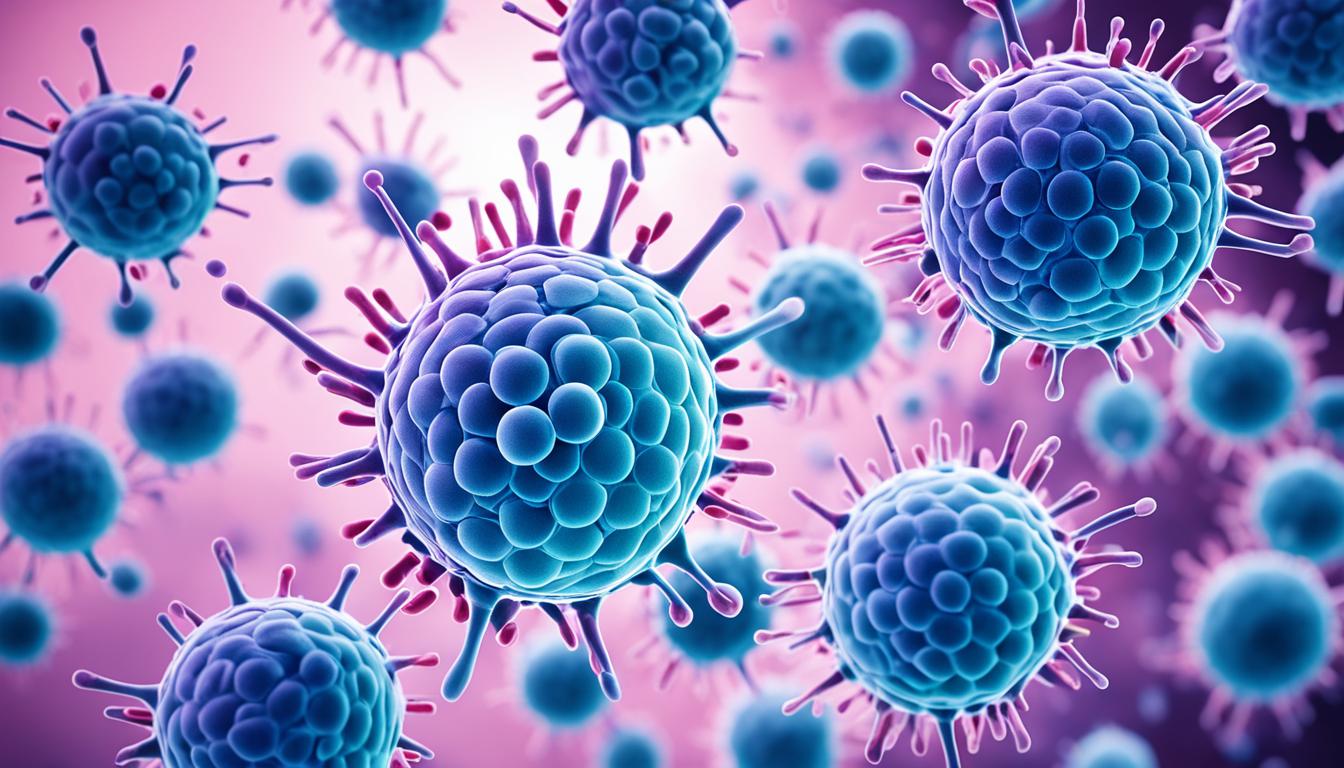Chronic hives is a skin condition that shows up as itchy welts. These welts might stay for over six weeks. Their cause is not clear, but it seems to be an overly active immune system. This can get triggered by certain foods, drugs, infections, and things that you’re allergic to or that irritate your skin.
If you keep getting hives for more than six weeks and doctors can’t find a reason, that’s chronic hives. There are medications like antihistamines and corticosteroids that can help manage the hives. Lately, stem cell therapy has shown some success in calming the immune system, which is a big step in getting rid of hives. But, stem cell therapy for hives still needs more research to prove it really works and is safe.
Key Takeaways:
- Chronic hives is a skin condition characterized by itchy, raised welts or hives.
- Common triggers for chronic hives include certain foods, medications, infections, and exposure to allergens or irritants.
- Diagnosis of chronic hives is based on recurring hives for at least six weeks with no identifiable cause.
- Treatment options for chronic hives include antihistamines, corticosteroids, and immune-modulating medications.
- Stem cell therapy shows promise as a potential treatment for chronic hives, but more research is needed.
Symptoms of Chronic Hives
Chronic hives show up as itchy, raised welts or hives on your skin over and over. They look different in size and shape each time. These hives can come and go without a clear cause. Sometimes, they can bring swelling, which is called angioedema.
The biggest sign of chronic hives is the urge to scratch due to intense itching. This can make daily life hard and disturb sleep. The hives might show up anywhere on your body and can move around. You might also feel tired, get headaches, or just not feel right.
Living with chronic hives can really lower your quality of life. It can cause you to feel sad and keep you away from others. If you have these symptoms, it’s key to see a doctor for the right diagnosis and care.
Persistent Itching
Suffering from chronic hives can mean dealing with non-stop itching. It can be really strong, making it tough to even sleep or do normal things during the day. Wanting to scratch all the time is not just uncomfortable but can lead to skin problems too.
Recurrent Hives
Chronic hives keep coming back, appearing and disappearing suddenly. They can change in how they look each time. The fact that they’re so hard to predict makes managing them difficult and frustrating.
General Discomfort
Besides itching and hives, you might feel generally unwell with chronic hives. This could show up as tiredness, headaches, or just a feeling of not being right. It’s vital to get help for these symptoms to manage your condition better.
Impact on Quality of Life
Chronic hives can really affect how you live your life. The constant need to scratch and the other symptoms can make you very emotional and want to avoid others. It’s essential to care for both the physical and emotional parts of chronic hives for overall health.
| Symptoms | Description |
|---|---|
| Persistent Itching | Intense itching that can interfere with daily activities and sleep |
| Recurrent Hives | Hives that appear and disappear without warning |
| General Discomfort | Fatigue, headache, and a feeling of unwellness |
| Impact on Quality of Life | Emotional distress and social isolation |
Causes and Diagnosis of Chronic Hives
Chronic hives, known as chronic idiopathic urticaria, can start for many reasons. The real cause is often a mystery. But some think the body’s immune system attacks itself by mistake, creating autoantibodies. These autoantibodies cause hives. Allergies to foods, medications, bites from insects, or things in the environment like pollen can also lead to hives. Infections, stress, and things like pressure or changes in temperature might play a role too.
Diagnosing chronic hives takes a close look at a person’s medical history and body. A doctor or nurse will ask about hives, their triggers, and your general health. They might do blood tests or tests on allergies. Sometimes, a tiny piece of skin needs to be looked at under a microscope to be sure it’s hives. It’s important to see a healthcare provider for the right diagnosis.
Allergic Reaction Triggers for Chronic Hives
- Allergens such as pollen, pet dander, or dust mites
- Certain foods, including nuts, shellfish, and eggs
- Medications, such as antibiotics or nonsteroidal anti-inflammatory drugs (NSAIDs)
- Insect bites or stings
Other Potential Triggers for Chronic Hives
- Infections, such as respiratory or urinary tract infections
- Emotional stress or anxiety
- Physical stimuli like pressure, temperature changes, or sunlight exposure
Figuring out your hives triggers can make them easier to deal with. After diagnosis, healthcare teams can make a special plan for you. This plan fights the real causes and eases your hives’ symptoms.
The Potential of Stem Cell Therapy for Chronic Hives
Stem cell therapy for chronic hives is being studied because it shows promise. These cells can calm the immune system and fight inflammation. Both these actions are important in chronic hives’ development. Studies have found that some got better, noticing fewer hives and a better life quality after the therapy.
To make sure, more studies are still needed. Researchers want to know the best ways to treat people with chronic hives using stem cells. They also look into the treatment’s safety and if it really works well.
Currently, there are other ways to help with chronic hives. People can use antihistamines, corticosteroids, and medicines that change the immune system. While we wait for more on stem cell therapy, these methods can make life better for those with the condition.

